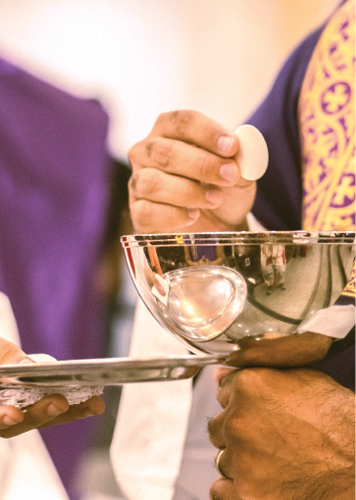Ever wonder why we Lutherans use the form of worship we do? In this series we examine the depth and meaning of the various elements of our Lutheran worship service.
Martin Luther did not ordinarily get involved in telling congregations how to conduct their worship services. He recognized correctly that we have a significant amount of Christian freedom in matters such as liturgy and hymns. So it was with a great deal of reluctance that he finally offered an order of service of his own, and when he did, it did not look much different from what was already being done. One aspect, however, which did end up undergoing significant change was the liturgy surrounding what we know as The Words of Institution (TLH, page 27; 1 Corinthians 11:23-26), which describe Jesus’ distributing the Lord’s Supper to His disciples the night before He was crucified (“the Lord Jesus on the same night in which He was betrayed took bread. . . .”)

In the liturgy of the Roman Church, the Words of Institution were part of a larger eucharistic prayer which was part of the canon, the portion of the service that forms the heart of the Catholic celebration of the mass. The canon with the eucharistic prayer contained theology that was not in keeping with Scripture. As an example, consider this 1902 English translation of the traditional prayer: “We, therefore, humbly pray and beseech Thee, most merciful Father, through Jesus Christ Thy Son, our Lord, that Thou wouldst accept and bless these gifts, these presents, these holy unspotted sacrifices, which, in the first place, we offer Thee for Thy holy Catholic Church. . . .” It is immediately clear that the Roman liturgy turns the Lord’s Supper into our sacrifice which we offer to Christ, rather than Christ giving us the forgiveness of sins through His sacrifice. For this reason, among others, Luther removed all this from the familiar liturgy of his day, leaving only the Words of Institution behind.
This explains why these words seem to stand alone and apart in our Lutheran liturgies. They are no longer surrounded by their original liturgical context. Some Lutherans have rewritten the objectionable Catholic prayers to try to return the Words of Institution to a more historic setting, but The Lutheran Hymnal did not.
What then is the reason for the Words of Institution in our services? Some have suggested that an unintended consequence of removing the eucharistic prayer and leaving only these words was that certain Lutherans over time began to think of the Words of Institution as something of a magic formula—as if when they were spoken they pinpointed the very moment when the body and blood were present with the bread and wine.
We would say rather that we use these words to consecrate the elements (the bread and wine). But what does that mean? It simply means that with these words we recognize that we are going to use this bread and wine to celebrate the Lord’s Supper as Jesus invites us to do. It distinguishes our use of the bread and wine in the sacrament from our use of bread and wine at home around the dinner table. The Words of Institution tell us, “This is the Lord’s Supper now that we are eating. He is feeding us with His body and blood for the forgiveness of our sins, and we are blessed.” They are not “magic” words. They are words which point to Jesus and express the Gospel. They show us what He is doing for us. With that in mind, we thankfully receive this precious gift.

is a professor at Immanuel Lutheran College in Eau Claire, Wisconsin.

